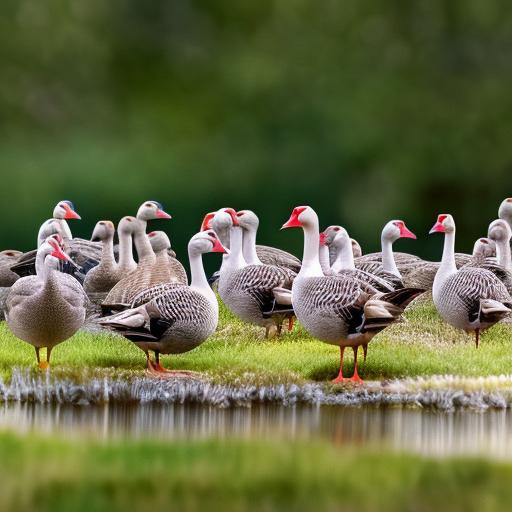Geese are fascinating and beautiful creatures that have been domesticated for thousands of years. They are known for their distinctive honking sound, V-shaped flying formations, and their strong sense of loyalty to their flock. Geese are social animals that thrive in the company of others and are often seen as symbols of loyalty, courage, and determination. There are many different breeds of geese, each with its own unique characteristics and traits. From the majestic Toulouse geese to the friendly and talkative Chinese geese, there is a goose breed to suit every preference.
Geese are also known for their intelligence and strong family bonds. They are excellent at foraging for food and can adapt to a variety of environments, making them well-suited for both rural and urban settings. Geese are also great at keeping pests like slugs and snails at bay, making them valuable additions to any garden or farm. With their striking appearance and endearing personalities, geese make wonderful neighbors and can bring joy and entertainment to those who have the pleasure of being in their company.
Key Takeaways
- Geese are social birds that form strong bonds with their flock and mate for life.
- Keeping geese as neighbors can provide natural pest control, entertainment, and a sense of security.
- Considerations for keeping geese include providing adequate space, shelter, and access to water.
- Caring for geese involves providing a balanced diet, regular health check-ups, and protection from predators.
- Potential challenges of keeping geese include noise, mess, and territorial behavior, but these can be managed with proper training and understanding.
Benefits of Keeping Geese as Neighbors
Keeping geese as neighbors can bring a multitude of benefits to both rural and urban communities. One of the most significant advantages of having geese nearby is their natural pest control abilities. Geese are excellent at keeping grassy areas free from pests like slugs, snails, and insects, making them valuable allies for gardeners and farmers. Their foraging habits also help to aerate the soil, contributing to healthier and more fertile land.
In addition to their pest control abilities, geese are also great at alerting their owners to any potential threats or intruders. Their loud honking and vigilant nature make them effective watchdogs, deterring unwanted visitors and providing an added layer of security to the property. Furthermore, geese are low-maintenance animals that require minimal care and can thrive on a diet of grass, making them an eco-friendly and cost-effective addition to any community. Overall, keeping geese as neighbors can contribute to a more sustainable and harmonious environment while providing entertainment and companionship to those around them.
Considerations for Keeping Geese
While geese can be wonderful neighbors, there are several important considerations to keep in mind before deciding to keep them on your property. Firstly, it’s essential to consider the space requirements for geese, as they need ample room to roam and graze. A lack of space can lead to stress and aggression among the flock, so it’s crucial to provide them with a spacious and secure outdoor area.
Another consideration is the noise level of geese, as they are known for their loud honking. While this can be charming to some, it may be a nuisance to others, especially in urban areas with close proximity to neighbors. Additionally, geese can be territorial and may become aggressive during breeding season, so it’s important to be mindful of their behavior and take precautions to ensure the safety of both the geese and those around them.
Furthermore, it’s important to consider local regulations and ordinances regarding the keeping of geese, as some areas may have restrictions or requirements for keeping poultry. It’s essential to familiarize yourself with these regulations and ensure that you are in compliance before bringing geese onto your property. By carefully considering these factors and taking the necessary precautions, you can create a positive and harmonious environment for both the geese and your community.
How to Care for Geese
Caring for geese requires attention to their specific needs and behaviors in order to ensure their health and well-being. Providing a suitable living environment is essential, as geese need access to clean water for drinking and bathing, as well as ample space for grazing and exercise. It’s important to provide shelter from the elements, especially during extreme weather conditions, to protect the geese from heat, cold, and predators.
Feeding geese a balanced diet is also crucial for their health and vitality. While geese primarily graze on grass, they can also benefit from supplemental feed that provides essential nutrients and vitamins. It’s important to avoid feeding them bread or other processed foods, as these can be harmful to their digestive system. Additionally, providing access to grit or small stones can help geese grind their food in their gizzards, aiding in digestion.
Regular health checks are important for monitoring the well-being of the geese and addressing any potential issues promptly. This includes checking for signs of illness or injury, as well as maintaining proper grooming and hygiene practices. Keeping their living area clean and free from waste is also essential for preventing disease and maintaining a healthy environment for the geese.
Potential Challenges of Keeping Geese
While keeping geese can be a rewarding experience, there are potential challenges that may arise when caring for these birds. One common challenge is managing their territorial behavior, especially during breeding season. Geese can become aggressive and protective of their nesting area, posing a risk to both humans and other animals. It’s important to be aware of this behavior and take precautions to minimize potential conflicts.
Another challenge is managing the noise level of geese, as their loud honking can be disruptive in certain environments. This is particularly relevant in urban areas where close proximity to neighbors may lead to complaints about noise pollution. Finding ways to mitigate the noise, such as providing adequate space for the geese to roam or using sound barriers, can help address this challenge.
Additionally, predators pose a significant threat to the safety of geese, especially in rural areas. Foxes, raccoons, and birds of prey are common predators that may target geese, so it’s important to implement measures to protect them from potential attacks. This may include securing their living area with fencing or netting and providing shelter that offers protection from predators.
By being aware of these potential challenges and taking proactive measures to address them, you can create a safe and harmonious environment for both the geese and those around them.
Building a Positive Relationship with Geese

Building a positive relationship with geese involves understanding their behavior and needs while establishing trust and mutual respect. Spending time with the geese and observing their natural behaviors can help foster a deeper connection and understanding of their individual personalities. Providing them with enrichment activities, such as access to water for swimming or interactive toys, can also help keep them stimulated and content.
Establishing a routine for feeding, grooming, and interacting with the geese can help build trust and familiarity. By approaching them calmly and consistently, you can create a sense of security and comfort for the geese, leading to a more positive relationship. It’s important to be patient and gentle when handling or interacting with the geese, as they are sensitive animals that respond well to gentle handling.
Furthermore, respecting their boundaries and allowing them the freedom to express their natural behaviors is essential for building a positive relationship. This includes providing them with ample space to roam and graze while minimizing disruptions to their environment. By creating a safe and nurturing environment for the geese, you can cultivate a positive relationship based on trust and mutual respect.
Living Harmoniously with Geese
In conclusion, living harmoniously with geese involves understanding their unique characteristics and needs while taking proactive measures to address potential challenges. By considering the benefits of keeping geese as neighbors, such as natural pest control and added security, you can create a more sustainable and enriching environment for both the geese and your community. However, it’s important to carefully consider the space requirements, noise level, and local regulations before bringing geese onto your property.
Caring for geese involves providing a suitable living environment, balanced diet, and regular health checks to ensure their well-being. While there may be potential challenges such as managing territorial behavior or noise levels, taking proactive measures can help create a safe and harmonious environment for both the geese and those around them. Building a positive relationship with geese involves understanding their behavior, establishing trust, and respecting their boundaries.
Overall, living harmoniously with geese requires patience, understanding, and a commitment to creating a nurturing environment that supports the well-being of these remarkable creatures. By doing so, you can enjoy the many benefits of having geese as neighbors while fostering a deeper connection with these fascinating animals.
If you’re considering keeping geese as pets, you might also be interested in learning about the benefits of raising chickens. PoultryWizard.com offers a helpful article on creating the perfect chicken coop in Chester, SC (source). Understanding the basics of poultry care and coop maintenance can provide valuable insights for anyone looking to expand their knowledge of backyard farming and animal husbandry.
FAQs
What are some reasons why neighbors keep geese?
Some neighbors keep geese for their ability to act as natural alarm systems, their ability to control pests, and their potential as a source of eggs and meat.
What are some potential challenges of keeping geese as neighbors?
Some potential challenges of keeping geese as neighbors include noise pollution from their honking, potential aggression towards humans and other animals, and the need for proper space and care.
How can neighbors address potential issues with keeping geese?
Neighbors can address potential issues with keeping geese by communicating openly with each other, setting boundaries for the geese, and ensuring that the geese are properly cared for and supervised.
Are there any local regulations or laws regarding keeping geese as neighbors?
Local regulations and laws regarding keeping geese as neighbors may vary by location. It is important for neighbors to research and understand any relevant regulations or laws before keeping geese.
Meet Walter, the feathered-friend fanatic of Florida! Nestled in the sunshine state, Walter struts through life with his feathered companions, clucking his way to happiness. With a coop that’s fancier than a five-star hotel, he’s the Don Juan of the chicken world. When he’s not teaching his hens to do the cha-cha, you’ll find him in a heated debate with his prized rooster, Sir Clucks-a-Lot. Walter’s poultry passion is no yolk; he’s the sunny-side-up guy you never knew you needed in your flock of friends!







